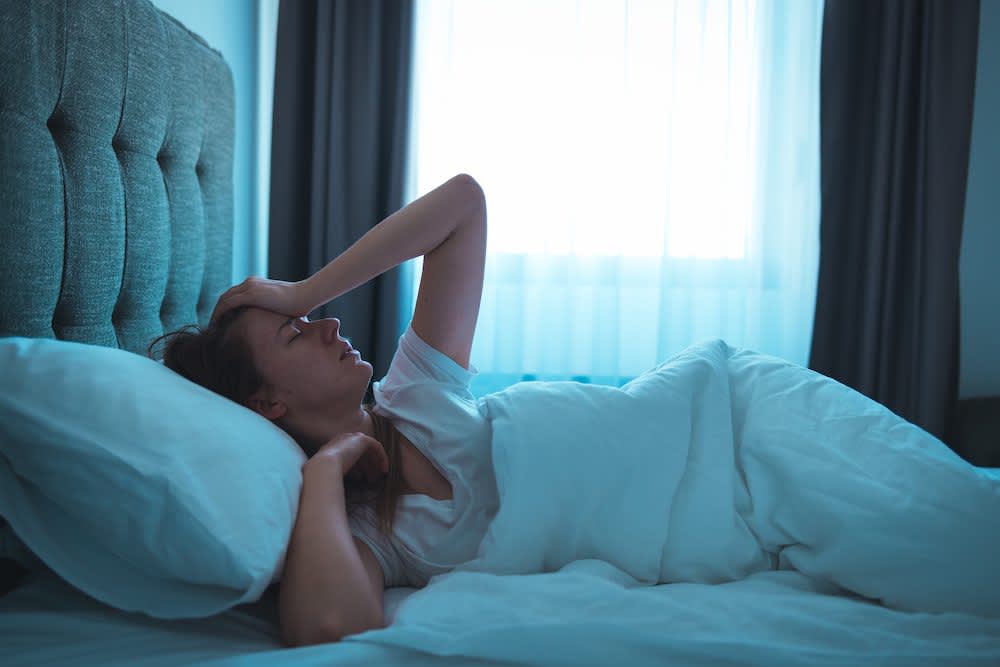There’s nothing like a good night’s sleep, but not everyone gets enough rest. In fact, 1 in 3 adults in the U.S. don’t get the recommended seven hours of sleep each night. Lack of sleep occurs at an even higher rate among young adults and people from lower socioeconomic backgrounds. In today’s fast-moving world, sleep deprivation is unfortunately familiar to many people.
Not getting enough sleep can cause a host of issues. It’s likely to make you feel cranky, and you might also have trouble focusing and reacting to situations you encounter throughout the day. In the long term, sleep deprivation is also linked with certain chronic health issues, like heart disease.
All humans have the basic need for sleep, and sleep is a vital part of a healthy life. If you find yourself only getting a few hours of shuteye most nights, it may help to learn the signs of sleep deprivation and what you can do to improve your sleep.
Signs of Sleep Deprivation
Specific signs, like feeling worn out during the day or changes to mood or cognition, can help you determine whether or not you’re getting enough sleep. Being aware of these symptoms can help you take the necessary steps to get more rest.
Excessive daytime sleepiness is one of the primary symptoms of sleep deprivation, but there are a variety of other signs that may point to you being sleep deprived:
- Struggling to stay awake during regular activities
- Feeling irritable, sad, or worried
- Fatigue
- Forgetfulness
- Inability to focus or think clearly
- Problems communicating with others
- Falling asleep while driving or when you’re at work
- Struggling to make good decisions
- Confusion
- Difficulty controlling your behavior
When you’re sleep deprived, you may even experience microsleeps. Microsleeps are brief periods of sleep that last for just a few seconds. They occur without warning, and you don’t even realize you are falling asleep. They can be dangerous if they occur while you’re doing something like driving.
We sometimes forget how important sleep is and how getting enough of it positively impacts everything from cognition to motor function. Fortunately, getting sufficient sleep usually resolves the issues associated with sleep deprivation.
Impacts of Sleep Deprivation
When people regularly miss out on sleep, they can experience a variety of problems, some of which are long term.
- Cognitive issues: Sleep deprivation interferes with the ability to perform complicated cognitive tasks such as analyzing complex sentences, using logic, or thinking in a flexible manner.
- Slower reaction times: People who are sleep deprived take longer to respond, especially when performing a task that’s usually automatic for them. That can be dangerous, depending on the situation.
- Mistakes: Sleep deprivation can cause people to make more mistakes because they are less able to concentrate on the task at hand.
- Workplace errors: Slower reaction times and trouble concentrating can also mean more workplace errors, which can have dire consequences in medical or industrial settings.
- Anxiety and sadness: Sleep deprivation can make people experience a mental state similar to anxiety or depression, and it can also exacerbate symptoms for those who already have anxiety or depression.
- Risk-taking: Lack of sleep may impact a person’s judgment, causing them to take dangerous risks and do things they wouldn’t normally try.
Sleep deprivation can impact kids, too. Children who don’t receive enough sleep may appear hyperactive. They might struggle with focus, exhibit behavioral problems, and have trouble learning at school.
Lack of Sleep and Car Accidents
Sleep deprivation is often a major contributing factor in car crashes. Each year in the U.S., drowsy drivers cause around 100,000 car accidents and 1,550 fatalities. Over half of all fatal truck crashes in the U.S. result from sleep deprivation.
Interestingly, lack of sleep has led to car accidents even when the people involved did not feel excessively sleepy right before the accidents occurred.
Other Health Issues Related to Sleep Deprivation
Not getting enough sleep can also impact a person’s physical health over time. Insufficient sleep is connected to a variety of health issues, including:
- Heart issues
- Weakened immune system
- Slower metabolism
- Obesity
- Diabetes
How Much Sleep Do People Need?
While the amount of sleep a person needs varies by individual, the American Academy of Sleep Medicine recommends that adults sleep at least seven hours each night. School-aged children should get 9 to 12 hours of sleep, while teenagers need to sleep at least 8 to 10 hours each night.
| Age Group | Recommended Amount of Sleep |
|---|---|
School-age, 6-12 years | 9-12 hours |
Teen, 13-18 years | 8-10 hours |
Adult, 18 years and older | At least 7 hours |
If you’re wondering how much sleep is right for you, try allowing yourself to sleep as long as you can until you naturally wake up. Or try sleeping for varying lengths of time for a few nights and seeing how alert and rested you feel. If you wake up refreshed after a certain number of hours and can remain focused even in boring situations, that’s probably the right amount of sleep for you.
Causes of Sleep Deprivation
Sleep deficiency encompasses more than sleep deprivation. It includes not getting enough hours of sleep but can also include poor-quality sleep, sleeping at nontypical hours, or not getting all the stages of sleep.
There are a variety of reasons why you might not be getting enough sleep, like a busy schedule, a new baby, or work responsibilities. Other factors, like a sleep disorder, might also interfere with the quality of your sleep.
- Demanding jobs: Many people may experience sleep deprivation because of their jobs. Those who work extended hours, shift rotations, early start times, or unpredictable work schedules can end up sleep deprived.
- Social responsibilities: Sometimes people shortchange themselves when it comes to sleep because of family or social responsibilities. In modern life, it’s common to overschedule and try to fit too many activities into one day, leading people to sacrifice their sleep.
- Aging: Aging can also result in lack of sleep since older individuals tend to wake up earlier. They may even awaken several times throughout the night.
- New baby: Young babies can wreak havoc on the amount of sleep their caregivers are able to get. This usually resolves over time as babies are able to sleep for longer stretches, but being a caregiver to young children simply tends to mean less sleep.
- Sleep disorder: Sleep disorders such as restless legs syndrome or sleep apnea can cause frequent awakenings throughout the night. Experiencing just five awakenings in an hour can negatively affect a person’s sleep, leading to daytime sleepiness.
- Sleep environment: In some cases, a person may receive insufficient sleep because of their sleeping environment. They may sleep in a bedroom that is too cold or warm. There may be too much noise or light in the room. Sometimes, simply the stress of being unable to sleep can contribute to wakefulness.
When to Seek Help
Sometimes it’s necessary to seek help from a doctor when dealing with lack of sleep, especially if your job or daily routine interferes with your ability to sleep regularly, or your lack of sleep impacts your daily life.
It’s also important to speak to a doctor if you regularly get more than eight hours of sleep and still don’t feel rested. This may be a sign of a sleep disorder or other health concern. Your doctor can help determine which treatments or approaches can help you get the sleep you need.
How to Get More Sleep
Finding ways to get more sleep can help boost your physical and emotional health. Changing sleep habits is one good way to enjoy more sleep. It’s also essential to make sleep a priority, allowing sufficient time to get enough rest.
Improve Sleep Hygiene
Improving your sleep hygiene can help you get more sleep. Sleep hygiene is the set of sleep habits that can encourage better quality sleep. Trying some of these habits may help improve your ability to sleep well.
- Keep the bedroom cool, dark, and comfortable: Using blackout curtains, a sound machine, or earplugs may help transform your bedroom into the ideal sleeping environment. Make sure you choose a comfortable mattress as well.
- Keep the bedroom calm and peaceful: If possible, keep items that relate to work or other stressful situations out of your bedroom.
- Put away electronic devices: Avoid using electronic devices such as phones, tablets, and computers before going to bed. These devices give off blue light, which can make it hard to fall asleep.
- Take care with medications and supplements: If taking medications or supplements, ask your doctor how they might affect your sleep.
- Be careful with meals: Avoid large or heavy meals a few hours before going to bed.
- Limit alcohol to early evening: If possible, avoid alcohol too close to bedtime.
- Find a relaxing bedtime routine: One way to relax is to take a soothing, hot bath before bedtime. Other relaxation techniques include yoga, meditation, listening to music, or guided imagery.
- Stick to a regular sleep schedule: Go to bed and wake up at the same time each day.
- Watch your caffeine intake: Try to limit caffeinated drinks to earlier in the day.
- Avoid nicotine: If possible, stay away from nicotine as it’s a stimulant that can interfere with sleep.
- Cut down on naps: While naps can increase your ability to remain alert, some people have trouble falling asleep at night when they take naps. If this occurs, consider limiting yours to about 20 minutes in the early afternoon.
- Exercise regularly: Make it a goal to incorporate physical activity into your daily routine, but avoid intense physical activity directly before bed.
References
Ask the Sleep Doctor
Have questions about sleep? Submit them here! We use your questions to help us decide topics for articles, videos, and newsletters. We try to answer as many questions as possible. You can also send us an email. Please note, we cannot provide specific medical advice, and always recommend you contact your doctor for any medical matters.






































